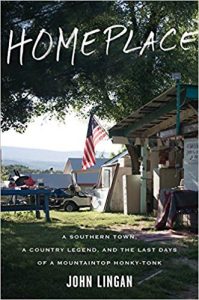John Lingan is out with his first book.

The southern town is Winchester, Virginia – although Lingan sees Berkeley Springs, West Virginia and Winchester as a pair.
The country legend is Jim McCoy.
The mountaintop honky-tonk is the Troubadour Lounge.
The book revolves around the Triple J – Jeanne, Jim and Joe.
Jeanne Mozier, who almost single handedly has turned Berkeley Springs from a sleepy rural town into a tourist spa destination.
Jim McCoy, who as a 19 year old radio disc jockey in Winchester, was the first to put the then 16 year old Patsy Cline on the air and who later went on to own and operate the Troubadour Lounge on Highland Ridge – where he was born and raised.
And Joe Bageant, who grew up right here in Morgan County off Shanghai Road and went on – in his classic book Rainbow Pie: A Redneck Memoir (Scribe Australia, 2010)– to lament about how the county – and the country – was transformed, in just two or three generations, from a self-sufficient tight community (think grow your own, hunt, fish and survive) to a people at the mercy of the corporate state (think Dollar General and Wal-Mart, with most everything from China.)
Bageant also went on to use Winchester as a launch pad for a speaking and writing career. He would accurately predict that the white hot anger he saw and wrote about in Winchester against the failed corporate Democrats would fuel the candidacies of the likes of Donald Trump. (See Deer Hunting with Jesus: Dispatches from America’s Class War (Random House 2007))
But Lingan’s book is not just about Jeanne and Jim and Joe and a bar on a mountaintop in Morgan County.
It’s a book about the transformation of America – from a place that saw people coming together – to share trucks to get tomatoes to market, to party together late into the night at the Troubadour – to a place where cookie cutter brew pubs and coffee shops take your money and give you beer and coffee.
“We are losing organically, locally networked culture,” Lingan told Russell Mokhiber of This Week in Morgan County. “That’s just not how communities run as much anymore. We are much more connected across space with people.”
Lingan longs for what the Troubadour represented – what urban sociologist Ray Oldenburg and his Project for Public Spaces argues are the great good places – bars, coffee shops, general stores – “where people can gather, put aside the concerns of work and home, and hang out simply for the pleasures of good company and lively conversation – are the heart of a community’s social vitality and the grassroots of democracy.”
But Lingan also has a keen eye for the fault lines that will determine the future.
In the book, Lingan writes about an out of towner approaching the bar at the Troubadour.
Codi Ford is the waitress.
“Can I get a bourbon neat?” he says to Codi.
“What’s that mean?” Codi asks.
“No ice,” the man says.
“Oh,” she said, grabbing the handle of Jim Beam and setting a plastic cup on the scuffed bar top.
“We call that a shot.”
Lingan comes from the neat side of town.
But he sides with the shot people.
Worth a read.
[John Lingan will be signing his book at the Winchester Book Gallery this Saturday July 21 from 6 pm to 8 pm.]
